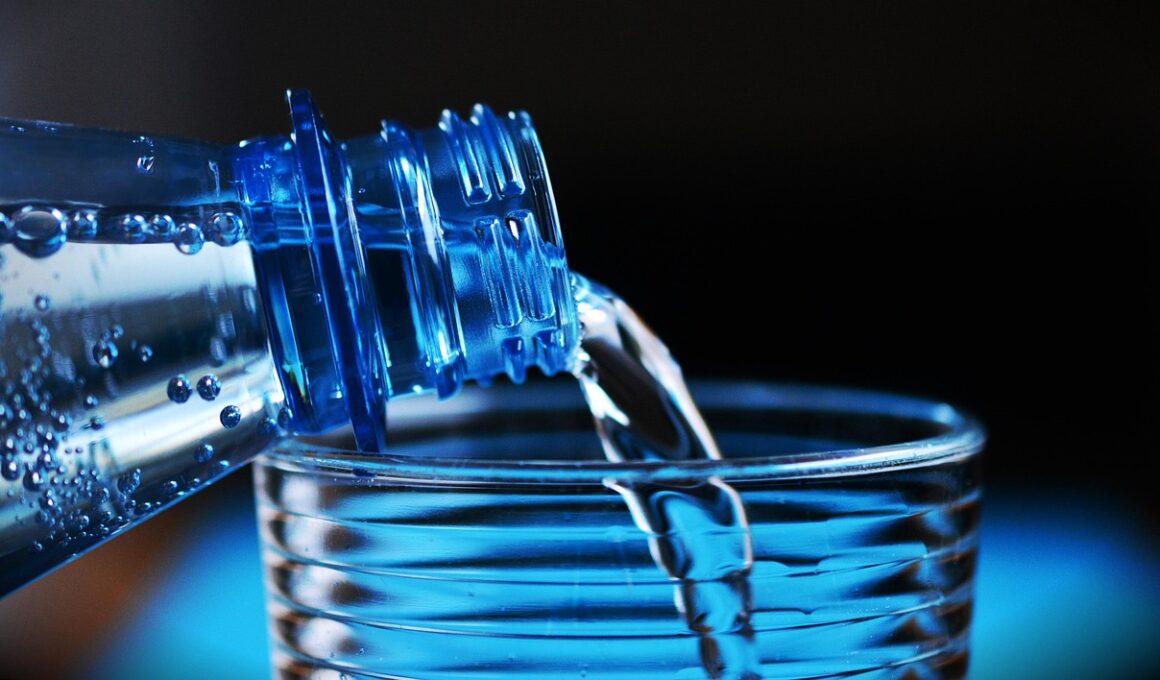Combining Water Intake with Intermittent Fasting for Better Results
Hydration plays a crucial role in any weight loss strategy, especially when combined with intermittent fasting. Proper water intake not only ensures that your body remains hydrated but also aids in metabolic processes. When you fast, your body enters a state where it begins to burn fat for energy, and adequate hydration can enhance this process significantly. Drinking water during your fasting window can help suppress appetite, making it easier to stick to your eating schedule. Many people struggle with hunger pangs while fasting, and by increasing your water intake, the feeling of fullness might be achieved more easily. Numerous studies suggest that drinking water can increase the number of calories burned significantly, a process known as water-induced thermogenesis. Additionally, staying hydrated can enhance energy levels, making it easier to maintain an active lifestyle. Whether you choose to drink plain water, herbal teas, or infused waters, the options are plentiful. Ultimately, combining efficient hydration practices with intermittent fasting can lead to improved results, not just in weight loss, but in overall wellness too.
The Benefits of Hydration
Understanding the connection between hydration and weight loss is essential. When the body is well-hydrated, it can function optimally, enhancing digestive processes and nutrient absorption. Dehydration can slow down metabolism and cause fatigue, making it harder to lose weight. Drinking water before meals is an effective technique for weight management, as it can lead to less food consumption overall. This practice can help prevent overeating by creating a sensation of fullness prior to meals. Moreover, hydration is crucial for maintaining muscle health and supporting workouts, which are vital components of a weight loss journey. The water helps transport nutrients to muscles and aids in recovery post-exercise. If you’re exercising while on a fasting regimen, ensuring adequate water intake can make all the difference in performance and endurance. Additionally, staying hydrated can improve skin health and reduce fatigue. It’s important to note that individual hydration needs may vary. Factors such as climate, activity level, and personal health can influence how much water one should drink daily for optimal health.
Timing Your Water Intake
Timing your water consumption appropriately is vital, particularly when practicing intermittent fasting. During the fasting period, drink water strategically. Start your day with a glass of water, as this can kickstart your metabolism and prepare your digestive system for the day ahead. Many find it beneficial to drink water right before meals during their eating windows, as it allows them to consume fewer calories and promotes a sense of fullness. While there is no fixed amount that suits everyone, consider gradually increasing your daily intake from the traditional 8 glasses of water. Monitoring your body’s responses will help you understand your hydration needs better. If you feel thirsty, drink more water, and if you feel too full, adjust accordingly. Herbal teas and flavored water can also be great alternatives that help maintain hydration levels and add variety. Maintaining an adequate intake of fluids helps regulate appetite and increases the likelihood of sticking to the intermittent fasting plan. Experiment with water timing to figure out what works best for enhancing overall dieting effectiveness.
Additionally, incorporating different forms of hydration can amplify the effects of your weight loss journey. Foods with high water content such as fruits and vegetables can play a pivotal role in maintaining hydration while providing essential nutrients. Foods like cucumbers, watermelons, and oranges can be an excellent addition to meals or snacks. These not only provide hydration but also contain fiber and vitamins, which support your overall health. Furthermore, monitoring your urine color can be an effective way to check for proper hydration—light yellow indicates good hydration, while a darker shade suggests you need more fluids. Keeping a water intake journal can help in maintaining focus, tracking how you feel, and adjusting when necessary. Developing the habit of drinking water regularly might require some time and effort, but it can yield substantial benefits in both fasting and overall health. In conclusion, the synergy of water intake and intermittent fasting can lead to improved weight loss outcomes. It’s crucial to remain consistent and to find a routine that works best for your lifestyle.
Hydration Strategies for Intermittent Fasting
When it comes to intermittent fasting, implementing effective hydration strategies is key. Start with setting reminders to drink water throughout the day, especially when the fasting window is over. This helps to replenish what might be lost during the fasting period and ensures that you do not fall into the trap of neglecting hydration. Incorporate a variety of liquids into your routine, as well. Herbal teas, black coffee, or even sparkling water can keep you satisfied without breaking your fast. Experimenting with different flavors and temperatures can also provide a refreshing change that keeps you engaged in your hydration practice. Another excellent strategy is to fill a water bottle that you can keep close by to encourage sipping throughout the day. This not only serves as a visual reminder but also helps track intake, ensuring that you meet your goals. Don’t forget about hydration after workouts, particularly if you are fasting. Replenishing with electrolytes may also be beneficial when exercising during fasting periods. Ultimately, creating individual hydration strategies will aid in maximizing the benefits achieved through fasting.
Incorporating mental awareness of hydration into your routine can greatly enhance your fasting experience. Before reaching for food during your eating window, pause to evaluate whether you are truly hungry or simply thirsty. This mindfulness approach can prevent unnecessary calorie intake and encourage better hydration practices. Additionally, keeping a hydration bottle or a marked pitcher handy can promote consistent drinking throughout the day. Involving friends or community groups to share tips and experiences related to hydration while fasting can also add motivation and accountability. Seek out challenges or set short-term goals to keep your efforts engaging and supportive. Remember, proper hydration is not merely about drinking more water; it is also about understanding your body’s unique needs and adjusting accordingly. Many people overlook thirst signals, so pay attention to your body’s cues. Keep a hydration journal or use apps that can help you keep track of water intake easily. These practices can lead to better outcomes in both hunger management and overall weight reduction efforts.
The Overall Impact on Weight Loss
Lastly, the overall impact of combining hydration with intermittent fasting can lead to notable weight loss improvements. When your body is properly hydrated, it becomes more efficient at processing nutrients and burning fat. Your metabolism will benefit from adequate hydration, leading to more effective calorie burning. Studies show that those who maintain proper hydration are more likely to experience thinner waistlines and better body composition. Weight loss involves creating a calorie deficit, and hydration can assist in this process by allowing your body to function more efficiently. As you embark on this journey, it’s essential to maintain a positive perspective and stay committed. Not every day will be perfect, but consistency is crucial to seeing results. Embrace the process and focus on small, actionable steps to enhance hydration and fasting efforts. Celebrate small victories along the way and adapt strategies as needed. Remember to always consult with a healthcare professional when making significant changes to your diet or fasting routine. In summary, marriage of hydration and intermittent fasting can achieve remarkable weight loss results.
In conclusion, a mindful and strategic approach to hydration in conjunction with intermittent fasting can optimize weight loss efforts. Ensure that you are well-hydrated to support your metabolism and overall bodily functions. Listen to your body’s signals and keep track of your daily water intake while adjusting it as necessary based on activity levels and climatic conditions. Ensuring that these practices fit naturally into your routine is vital for long-term adherence. By making hydration a priority, you can enable your body to utilize its full potential, creating favorable conditions for weight loss. Hydration impacts not only your physical health but also mental clarity, energy levels, and overall well-being. By progressing steadily, incorporating various methods, and maintaining commitment, you set the stage for successful intermittent fasting experiences. The focus should be on being as consistent as possible while also flexible. Above all, recognize that each person’s body is unique, so what works for one individual might not work for another. With dedication and a smart approach to hydration and fasting combined, you can achieve your weight loss goals while enjoying the journey.


